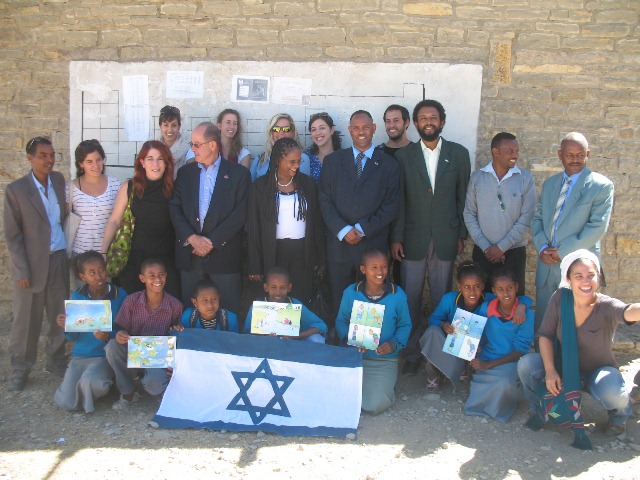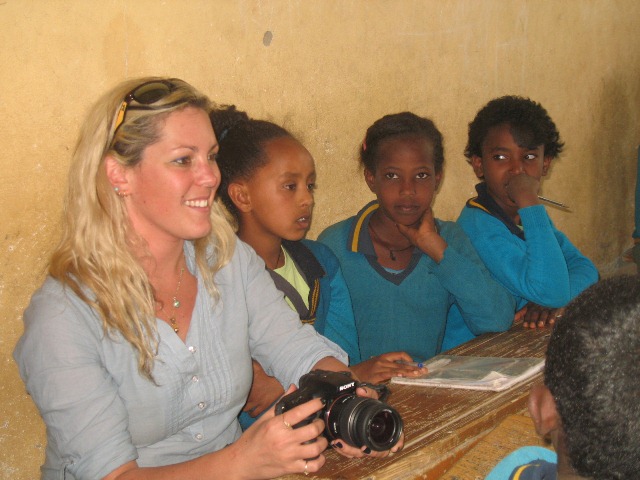
A delegation including nine BGU students are currently in the city of Makele in Ethiopia, taking part in an extensive educational medical program which aims to eliminate neglected tropical diseases. The program, led by Prof. Zvi Bentwich for the last four years, is being implemented by the Faculty of Health Science’s Center for Emerging Diseases, Tropical Diseases and AIDS (CEMTA) with the assistance of other bodies, including UN organizations, local government agencies and the Israeli Foreign Ministry.
Six of the students in the delegation are BGU graduates in physiotherapy; two are graduates of the Medical Laboratory Studies Program and one a graduate in African Studies from the Open University. The delegation was the welcome initiative of two students - Nitzan Kimmelman and Matan Friedman, who approached the University’s Africa Centre and the late Prof. Tamar Golan, who put them in touch with Prof. Bentwich. The two worked hard to promote the initiative, putting together and preparing a group of volunteers, fundraising and preparing the site in Ethiopia. The delegation set off this past October, led by Kimmelman, the other members of the delegation are: Inbar Bardach, Nadav Baharab, Efrat Eini, Yoav Ortner, Kim Mizrachi, Rotem Kadosh, Shira Brandwein and Klil Atar.
In the year preceding the departure of the delegation, its members had extensive training including lectures on Ethiopia - its culture and unique history, lectures on the morbidity rate in the country with a focus on AIDS and neglected tropical diseases, as well as practical preparation for the "health education" work expected of them in the field.
According to Prof. Bentwich, neglected tropical diseases - diseases caused by intestinal worms - harm more than a quarter of the world's population, especially the poorest populations and are responsible for high morbidity, cause damage to mental abilities, learning disabilities, growth retardation and other health disorders, and in addition to all these, can also cause excessive damage in the major epidemics of our time - AIDS, tuberculosis and malaria. "The continued neglect in treating this issue can be attributed largely to the fact that these diseases are not found in developed and rich countries, there they do not exist," he says.
The program in Ethiopia includes medical intervention and administering medications, combined with health and hygiene education, conducting surveys before and after the intervention and addressing the problems of sanitation and water purification. The program is integrated into the global trend to eradicate poverty and combat major diseases - AIDS, tuberculosis and malaria. Prof. Bentwich notes, "Aggregate global data indicate that treatment is worthwhile, very cheap, simple and effective and achieves good results long term."
Initially, the program began as a pilot carried out in three areas, including Makele and since has gradually expanded and reached approximately 300,000 people. It is hoped to expand operations into the Tigray Province, where Makele is situated, and later become a sustainable national program for the remainder of the country’s population.
The student delegation in Makele, took the responsibility in leading the activities for health education as their main mission which they combine with other activities for the community, including volunteering at the local hospital and physiotherapy center in the city.
Those who have recently visited schools in the city can see the student teams working feverishly - teaching, organizing activities, painting, singing and even practicing with the students the rules for washing hands, while mainly focusing on the training of selected staff in each of the schools. These teams consist of teachers, students and parent representatives who were selected to implement the health and hygiene education program among students and parents through the "health clubs" of each school. At the end of each training session, the delegation accompany the new instructors in their first steps in front of classrooms and parents, and after a few days go to a new school and start a similar process.
In the afternoon, you can find BGU physiotherapists in the physiotherapy units at the local hospital (Ayder Hospital) and local physiotherapy centers, collaborating with local medical teams and assisting them in treating patients.
The words of Nitzan Kimmelman speak for themselves:
"I wanted to tell you that yesterday was a very exciting day for the project. My team (Klil, Inbar and myself) were in one of the schools to watch students teach the classes. They did it so well. After the class the whole school gathered together and some of the health club team put on a play on the subject. One of the teachers helped them to direct the play, they prepared costumes and accessories, it was just amazing and moving, and came about through their own initiative and ideas. The play was seen by around 1,500 students!!
... There was another exciting event for our team yesterday. We had a workshop for teachers in a new school we were given. They welcomed us with the traditional coffee ceremony in the staff room before the start of the workshop and even hung a welcome sign for us on the door. "

Above: Nitzan Kimmelman, physiotherapy graduate and initiator of the Student Delegation with Ethiopian children

Above: The delegation with Israel's ambassador to Ethiopia, Bleinis Zebadiah.
